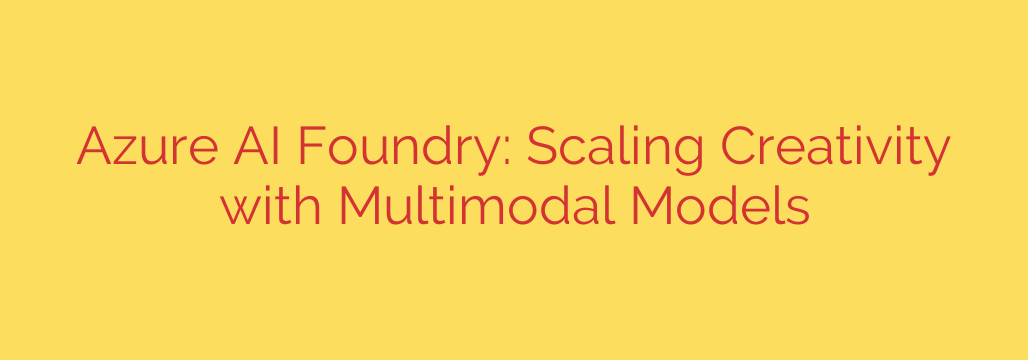
Build Your Own Custom Copilot: A Deep Dive into Enterprise AI Solutions
Generative AI has moved beyond a technological curiosity to become a critical component of modern business strategy. While off-the-shelf AI tools offer a glimpse into this new frontier, true competitive advantage lies in creating custom AI solutions that understand your unique data, workflows, and brand voice. The next evolution in enterprise AI is not just about using AI, but building it.
This is where the concept of a dedicated AI “foundry” comes into play—a comprehensive platform designed to empower organizations to develop, fine-tune, and deploy their own sophisticated AI assistants, or “copilots.” By providing the necessary tools, models, and infrastructure, this approach helps companies move from being passive AI consumers to active AI creators.
What Is an Enterprise AI Foundry?
Think of an AI foundry as a specialized workshop for building enterprise-grade generative AI applications. It’s an integrated environment that brings together three critical elements: a diverse selection of powerful AI models, tools for deep customization, and a secure, scalable infrastructure for deployment.
The primary goal is to simplify the complex process of creating a custom AI copilot. Instead of starting from scratch, organizations can leverage a pre-built foundation to accelerate development and focus on what truly matters: infusing the AI with their unique business intelligence and operational knowledge. This enables the creation of AI assistants that can perform highly specific tasks, from analyzing internal financial reports to generating marketing copy that perfectly matches a company’s tone.
The Three Pillars of a Modern AI Foundry
A successful platform for building custom AI is built on three core pillars that work together to provide flexibility, power, and reliability.
1. An Expansive and Curated Model Catalog
The foundation of any great AI application is the underlying model. A robust AI foundry provides access to a curated catalog of premier AI models from leading developers. This includes not only powerful proprietary models but also top-tier open-source options.
For instance, having the flexibility to choose between models like Meta’s Llama 2, Mistral’s highly efficient models, and other state-of-the-art architectures is a significant advantage. This variety allows developers to select the best model for their specific use case, balancing factors like performance, cost, and specialization. Choice is crucial because no single AI model is perfect for every task.
2. Powerful Fine-Tuning and Customization Tools
A generic AI model doesn’t know your company’s jargon, your product specifications, or your customer history. This is where fine-tuning comes in. The ability to fine-tune pre-trained models with your own proprietary data is arguably the most valuable feature of an AI development platform.
This process allows you to:
- Align the AI with your brand voice: Ensure all generated content is consistent with your company’s style guide.
- Teach it specialized knowledge: Train the model on internal documents, technical manuals, or past project data to make it an expert in your domain.
- Improve accuracy and relevance: Reduce generic or incorrect responses by grounding the model in your company’s specific reality.
These customization tools bridge the gap between a general-purpose AI and a true, value-adding business asset.
3. Enterprise-Grade Deployment and Scaling
Building a prototype is one thing; deploying a reliable, secure AI application to thousands of users is another. The third pillar is the underlying cloud infrastructure that ensures your custom copilot can perform under pressure.
This includes managed infrastructure that handles the complexities of scaling, security, and monitoring. By building on a trusted cloud platform like Microsoft Azure, companies can be confident that their AI solutions are protected by enterprise-grade security protocols and can scale seamlessly as demand grows. This also includes features for responsible AI, helping organizations monitor for harmful content and ensure their applications are used safely and ethically.
Beyond Text: The Rise of Multimodal AI
The future of AI is multimodal. This means AI that can move beyond text to understand and process information from images, audio, and video. This capability dramatically expands the potential use cases for custom AI copilots in the enterprise.
Imagine an AI assistant that can:
- Analyze charts and graphs within a PDF report to summarize key visual trends.
- “Watch” a recording of a customer service call to identify product issues and gauge customer sentiment.
- Examine images from a manufacturing line to detect defects in real-time.
By integrating multimodal capabilities, businesses can build AI copilots that interact with information in a much more human-like way, unlocking deeper insights and automating more complex workflows.
Actionable Advice for Building Your Custom AI
Ready to move from theory to practice? Here are four key steps to guide your custom AI development journey:
- Clearly Define the Use Case: Start with a specific, high-value business problem. Is it automating customer support, accelerating research and development, or improving internal knowledge management? A focused goal will guide your entire development process.
- Select the Right Foundation Model: Based on your use case, choose a model from the catalog that best fits your needs. Consider its strengths—is it better at creative text generation, logical reasoning, or code completion?
- Prioritize Data Quality: The success of fine-tuning depends entirely on the quality of your data. Ensure your training datasets are clean, relevant, and well-organized. The better the data, the smarter your custom copilot will be.
- Implement and Monitor Responsibly: Deploy your AI with clear guidelines and monitoring systems in place. Track its performance, gather user feedback, and use responsible AI tools to ensure it operates safely and ethically.
Ultimately, the shift toward custom AI creation marks a pivotal moment for businesses. By leveraging comprehensive platforms, organizations can finally build intelligent copilots that act as true extensions of their team—driving innovation, boosting productivity, and creating a lasting competitive edge.
Source: https://azure.microsoft.com/en-us/blog/unleash-your-creativity-at-scale-azure-ai-foundrys-multimodal-revolution/








